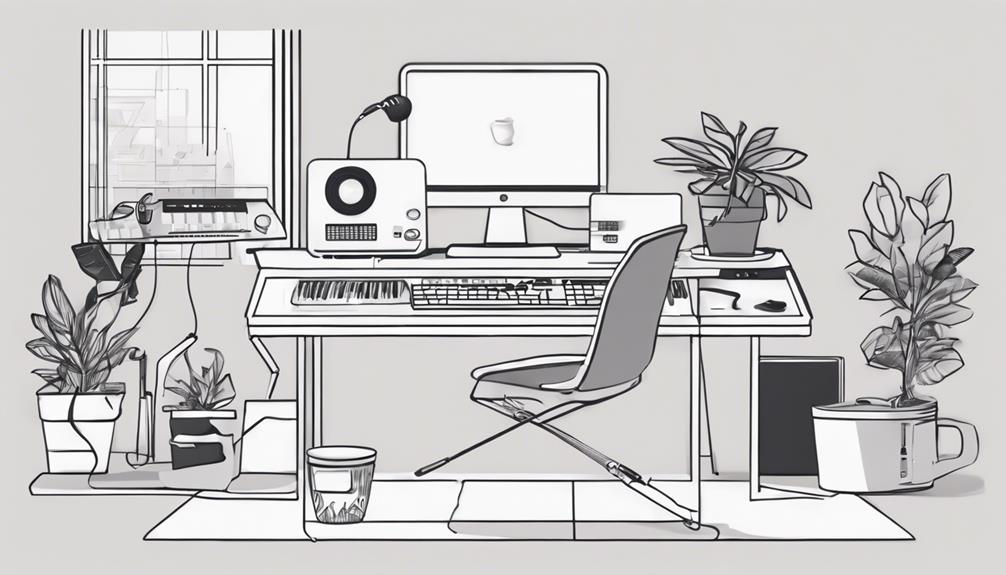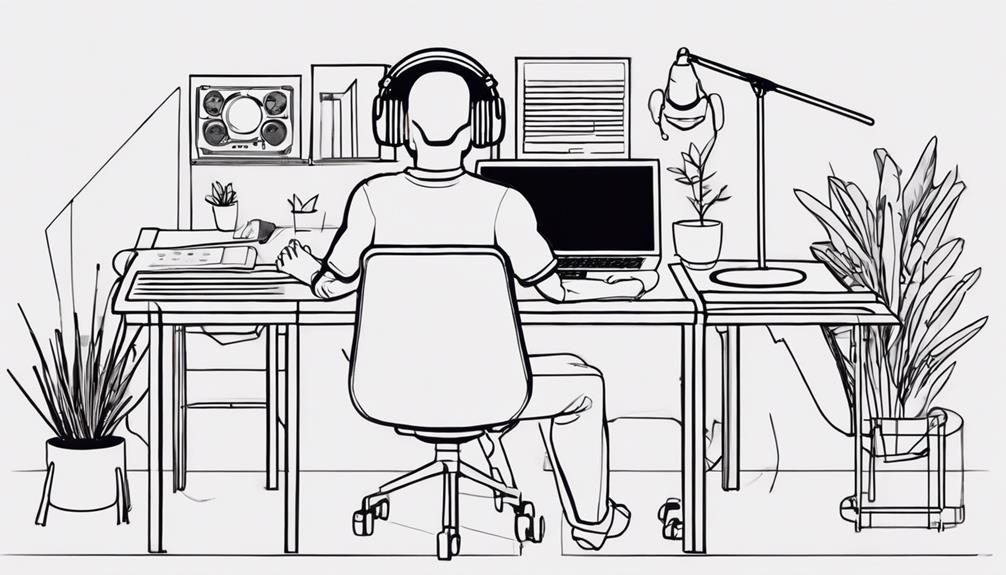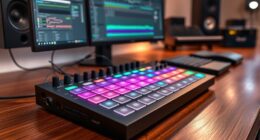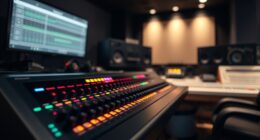To ace music production, master choosing gear and genres, setting up studio, and nailing DAW functions. Select studio headphones wisely. Experiment with different DAWs and practice creating beats and melodies. Dive deep into music theory. Collaborate with industry pros for guidance and mentorship. Mastering these areas will set you on the path to success in music production.
Key Takeaways
- Experiment with different DAWs and plugins to find your preferred tools.
- Practice creating beats and melodies to develop your skills.
- Dive into music theory to understand composition fundamentals.
- Seek mentorship from experienced producers for personalized guidance.
- Join online communities and forums for knowledge sharing and support.
Choosing Music Genre and Gear
When starting your journey in music production, selecting the right music genre and gear is essential for achieving your desired sound quality. Your music genre choice should align with your interests and preferences.
Different genres have unique characteristics that influence gear choices, including specific instruments and effects. Consider how your chosen genre may impact your Digital Audio Workstation (DAW) selection, as certain software features cater better to particular genres. Research popular plugins tailored to your genre to enhance your production process.
As you explore gear options, create a shortlist of instruments, effects, and software to test and demo. This hands-on approach will help you make informed purchasing decisions based on how well the gear complements your chosen music genre.
Setting Up Home Studio
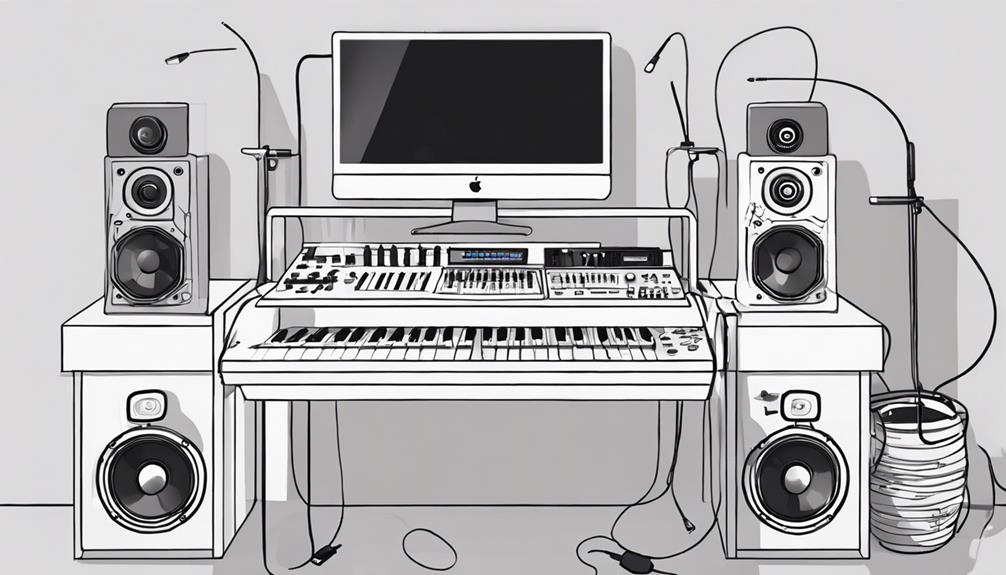
Selecting an appropriate space with minimal noise and good acoustics is crucial when setting up your home studio for music production. To guarantee a productive and creative environment, consider the following tips:
- Invest in essential gear such as studio headphones, audio interface, MIDI keyboard, and studio monitors to enhance your music production experience.
- Choose a digital audio workstation (DAW) that suits your music production goals and workflow.
- Acquire quality microphone(s) and cables for recording vocals and instruments in your home studio, ensuring clear and professional sound quality.
- Consider implementing acoustic treatment options like bass traps, acoustic panels, and diffusers to improve the acoustics of your studio space and reduce unwanted reflections.
Mastering DAW Functions
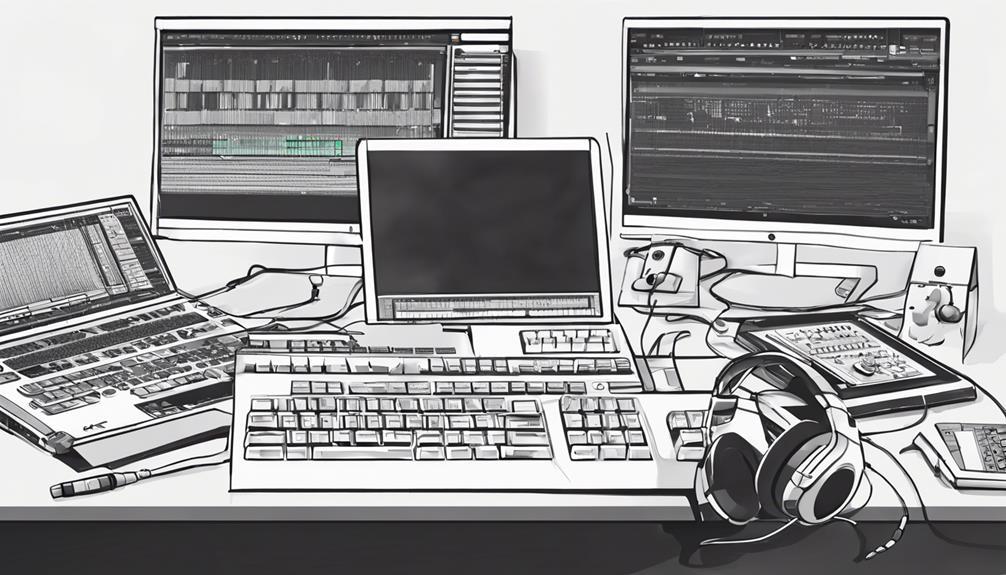
Mastering DAW functions involves learning essential tools for audio editing, MIDI sequencing, and mixing capabilities to enhance your music production skills. Understanding your DAW's interface layout, shortcuts, and navigation is vital for a smooth workflow.
Practice utilizing automation features to control volume, panning, and effects over time, as well as experimenting with a variety of plugins to enhance your sound. Virtual instruments can also add depth and creativity to your tracks.
To further your skills, explore online tutorials, DAW manuals, and hands-on practice projects. Customizing your DAW settings, templates, and preferences can optimize your productivity.
Investing in Studio Headphones
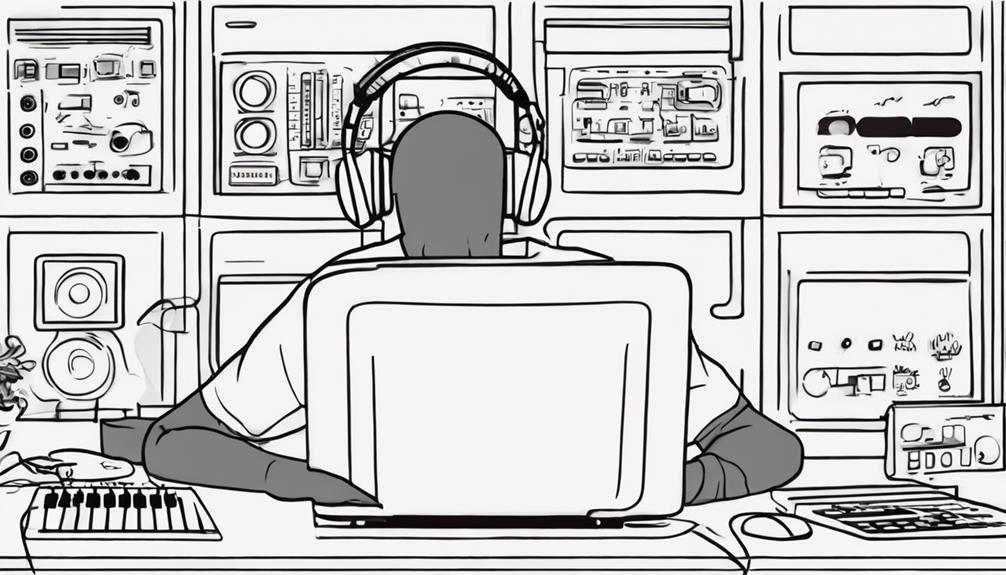
When it comes to investing in studio headphones, you need to focus on choosing the right model that suits your music production needs.
Understanding sound quality is key to ensuring accurate monitoring and making informed decisions during production.
Additionally, the importance of comfort can't be overstated, as long hours in the studio require headphones that feel good to wear.
Choosing the Right Model
For superior sound accuracy in music production, prioritize selecting studio headphones with closed-back designs. When investing in studio headphones, closed-back models offer accurate sound isolation, essential for monitoring recordings without external interference.
To guarantee you capture the full spectrum of audio, look for headphones with a wide frequency response, ideally ranging from 20Hz to 20kHz. Opt for headphones with a flat frequency response to monitor your music accurately without any added coloration.
Comfort is key during long studio sessions, so choose headphones with comfortable padding and adjustable headbands for a personalized fit. Reputable brands like Sony MDR7506 or Audio-Technica ATH-M50x are known for their quality and reliability in the music production industry.
Understanding Sound Quality
Invest in quality studio headphones to guarantee accurate sound monitoring and representation in music production. When selecting studio headphones, opt for models that offer a flat frequency response to make sure your music is reproduced faithfully without any artificial enhancements.
Look for headphones with a wide frequency range, typically from 20Hz to 20kHz, for detailed sound reproduction across the entire audio spectrum. Closed-back headphones are preferred for music production as they provide better isolation, preventing sound leakage and allowing for critical listening in a controlled environment.
These headphones excel at blocking out external noise, enabling you to focus on the nuances of your music without distractions. The detailed sound reproduction offered by quality studio headphones is essential for detecting subtle nuances in your tracks, helping you make informed decisions during the production process.
Prioritize sound quality, flat frequency response, and isolation capabilities when investing in studio headphones for critical listening and accurate music production.
Importance of Comfort
To guarantee a high-quality music production environment, prioritize the comfort of your studio headphones for extended, focused sessions. Investing in quality studio headphones is essential for accurate sound monitoring during music production.
Here's why comfortable studio headphones are important:
- Prevent Ear Fatigue: Comfortable studio headphones allow you to work for long hours without experiencing discomfort or tiredness in your ears.
- Isolate External Noise: By providing a snug fit, comfortable studio headphones help isolate external noise, enabling you to concentrate on the intricate details of your music.
- Ensure Detailed Sound Representation: Comfort plays a significant role in ensuring that you can accurately hear the nuances and subtleties of your music, contributing to a high-quality production experience.
- Enhance Overall Quality: Quality studio headphones, coupled with comfort, enhance the overall music production experience by delivering a clear and precise sound representation that aids in your creative process.
Experimenting With DAWS
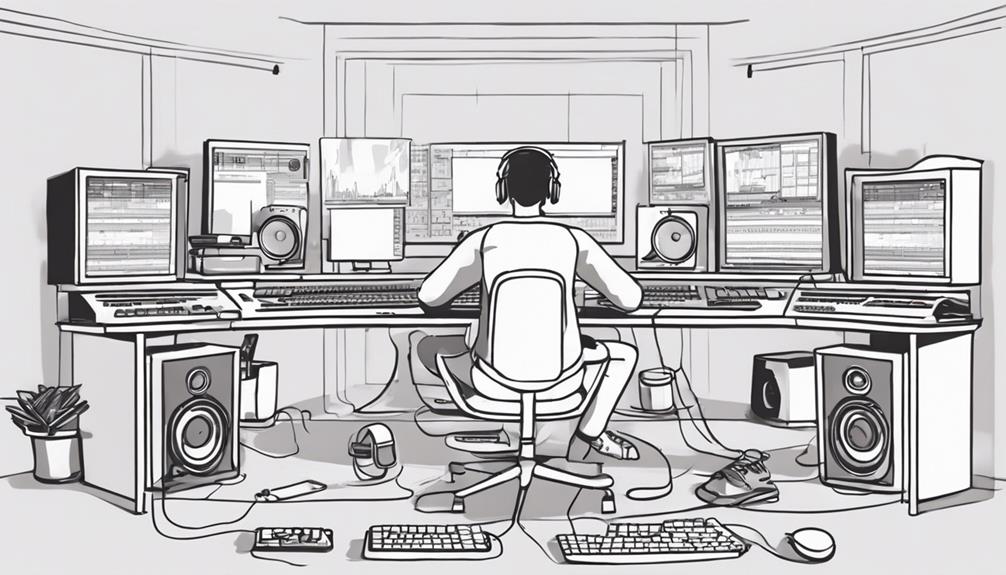
Try out different Digital Audio Workstations (DAWs) to discover which one aligns best with your music production process. Experiment with popular options like Ableton Live, Logic Pro, FL Studio, and Pro Tools.
Many DAWs offer trial versions, allowing you to test their features and interfaces before committing. Utilize these trials to compare the compatibility with plugins and ease of use for each software. Consider factors like the learning curve and the availability of tutorials when exploring different DAW options.
It's beneficial to gather insights from online forums, user reviews, and tutorials to understand the strengths and weaknesses of each DAW. By experimenting with various DAWs, you can determine which one suits your workflow and production style.
Take advantage of the resources available to make an informed decision when selecting the best DAW for your music production needs.
Practicing Beat and Melody Creation
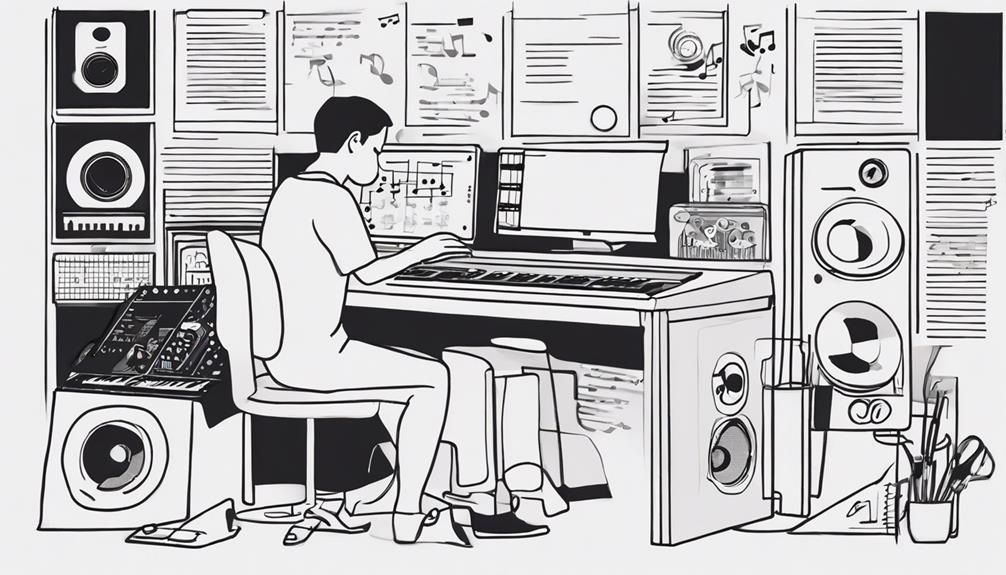
Practice experimenting with different drum patterns and rhythms to develop unique beats for your music production projects. By exploring various beat patterns and drum rhythms, you can infuse your tracks with originality and energy.
Additionally, working on chord progressions and scales will help you construct compelling melodies that resonate with your audience. Understanding music theory is essential for enhancing the harmonic structure of your compositions and creating cohesive arrangements.
Engage in the following activities to improve your beat and melody creation skills:
- Analyze popular songs to gain insights into effective beat and melody arrangements.
- Collaborate with fellow musicians to exchange ideas and learn new techniques.
- Experiment with different musician techniques to add diversity and flair to your tracks.
- Practice combining beat patterns and chord progressions creatively to craft dynamic compositions.
Immersing in Music Theory
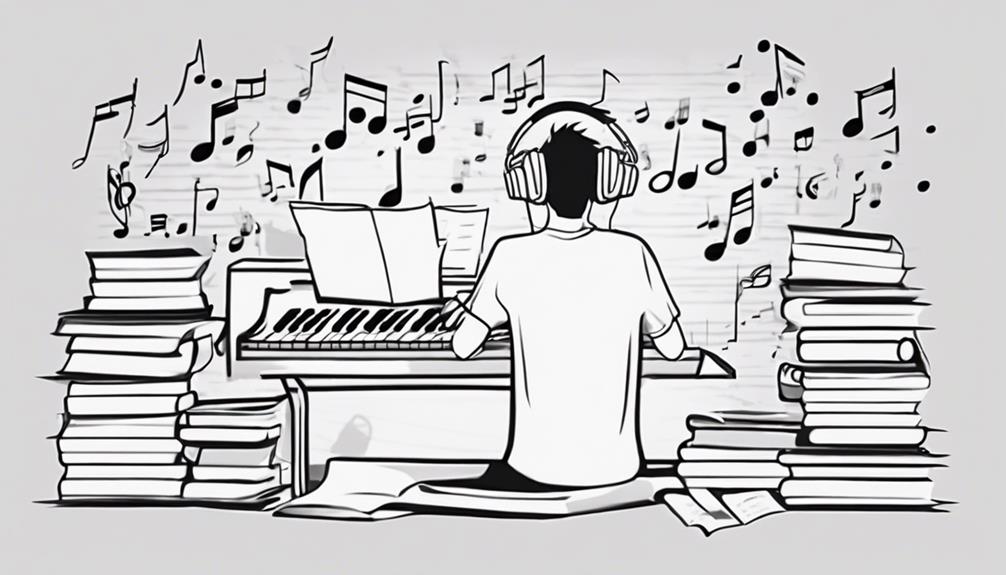
Explore music theory to grasp the foundational principles of harmony, melody, rhythm, and structure in music production. Delve into the world of music theory to understand essential concepts like scales, chords, intervals, and how they form the building blocks of music.
By understanding the relationships between these elements, you can create compositions that are coherent and engaging.
Learning about harmony will help you combine different notes to produce pleasant sounds, while understanding melody will enable you to craft memorable tunes. Rhythm is essential for establishing the tempo and groove of your tracks, and structure guides the arrangement of your music.
Seeking Guidance From Producers

Connecting with experienced producers is an essential step in gaining valuable insights and guidance for studying music production. Seeking mentorship from established producers can provide personalized advice on honing your skills.
Participating in workshops or masterclasses led by industry professionals offers the opportunity to learn advanced techniques directly from experts.
Joining online communities or forums where producers share knowledge and offer support can be beneficial for your learning journey.
Collaborating with seasoned producers on projects allows you to learn from their expertise and enhance your skills.
By engaging with producers through mentorship, workshops, online communities, and collaboration, you can tap into a wealth of knowledge and guidance to improve your music production skills effectively. These interactions not only help you refine your craft but also provide valuable insights into the creative and technical aspects of producing music. By focusing on understanding music production basics, you’ll establish a strong foundation that enables you to experiment and grow as a producer. Over time, this collaborative learning approach can lead to a unique sound that sets you apart in the industry.
Take advantage of these opportunities to learn from experienced professionals and accelerate your growth in the field.
Frequently Asked Questions
How Do You Become an Expert Music Producer?
To become an expert music producer, immerse yourself in practice, theory, and collaboration. Experiment, learn, and seek mentorship. Attend events, use online resources, and stay updated. Dedication and continuous learning will help you refine your skills and expertise.
How to Learn About Music Productions?
To learn about music production, explore online resources, practice with digital audio workstations, engage in music production communities, experiment with different genres, and seek industry insights. Stay updated, connect, and grow your skills!
What Is the Fastest Way to Learn Music Production?
Want to excel in music production quickly? Engage in online courses, practice daily with clear goals, receive mentorship from pros, experiment with various genres, and join music communities. This approach accelerates learning and keeps you inspired.
What Is the Best Way to Study Music?
To study music effectively, immerse yourself in online resources, engage in hands-on practice, and follow structured plans. Explore music theory, composition, DAW skills, and sound manipulation. Analyze production techniques, experiment with genres, collaborate with peers, seek feedback, and attend workshops to grow.
Conclusion
Now that you've taken the first steps in your music production journey, continue to explore and experiment with different genres, gear, and techniques.
Remember, mastering music production is a never-ending process full of surprises and challenges. Embrace the journey and keep pushing yourself to new heights.
With dedication and passion, you'll soon be creating amazing music that truly resonates with your audience. Keep up the great work!

